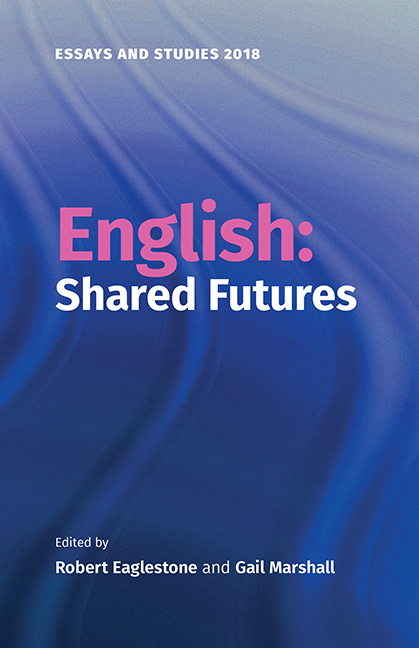Book contents
- Frontmatter
- Contents
- Notes on Contributors
- Acknowledgements
- Abbreviations
- Introduction
- The Changing Picture of School English
- From A-Level to HE: Working Towards a Shared Future?
- English Outreach: Academics in the Classroom
- From Provider to Stager: The Future of Teaching English in HE
- Pedagogic Criticism: An Introduction
- Exquisite Tensions – Narrating the BAME ECA Experience
- Postgraduate Futures: Voices and Views
- Shared Futures: Early Career Academics in English Studies
- Some Reflections on the Funding of English Departments
- English: The Future of Publishing
- Digital Futures
- A View from the United States: The Crisis in the Humanities; the Liberal Arts; and English in the Military Academy
- The Future of Borders
- ‘Between and Across Languages’: Writing in Scotland and Wales
- Exploring Intersections between Creative and Critical Writing: An Interview with Elleke Boehmer
- Integrating English
- Employability in English Studies
- Creative Living: How Creative Writing Courses Help to Prepare for Life-long Careers
- Practice at Large: How Creative Writing can Enhance University Research Environments
- ‘And who can turn away?’ Witnessing a Shared Dystopia
- English and the Public Good
- ‘Can Wisdom be put in a silver rod? / Or Love in a golden bowl?’ On Not Defending the Humanities
- ‘Something Real to Carry Home When Day Is Done’: The Reader in Future
- Afterword
- Index
The Changing Picture of School English
Published online by Cambridge University Press: 15 October 2019
- Frontmatter
- Contents
- Notes on Contributors
- Acknowledgements
- Abbreviations
- Introduction
- The Changing Picture of School English
- From A-Level to HE: Working Towards a Shared Future?
- English Outreach: Academics in the Classroom
- From Provider to Stager: The Future of Teaching English in HE
- Pedagogic Criticism: An Introduction
- Exquisite Tensions – Narrating the BAME ECA Experience
- Postgraduate Futures: Voices and Views
- Shared Futures: Early Career Academics in English Studies
- Some Reflections on the Funding of English Departments
- English: The Future of Publishing
- Digital Futures
- A View from the United States: The Crisis in the Humanities; the Liberal Arts; and English in the Military Academy
- The Future of Borders
- ‘Between and Across Languages’: Writing in Scotland and Wales
- Exploring Intersections between Creative and Critical Writing: An Interview with Elleke Boehmer
- Integrating English
- Employability in English Studies
- Creative Living: How Creative Writing Courses Help to Prepare for Life-long Careers
- Practice at Large: How Creative Writing can Enhance University Research Environments
- ‘And who can turn away?’ Witnessing a Shared Dystopia
- English and the Public Good
- ‘Can Wisdom be put in a silver rod? / Or Love in a golden bowl?’ On Not Defending the Humanities
- ‘Something Real to Carry Home When Day Is Done’: The Reader in Future
- Afterword
- Index
Summary
The story of English in schools over the past few decades has been one of constant change. At every level, from KS3 to AL, successive governments have made it their mission to reform the system, sometimes just tinkering with the examinations, but more often than not introducing major changes that require significant re-thinking and re-structuring. Some of the changes have been content-based – for instance, prescribing or proscribing content (as in the case of former secretary of state for education, Michael Gove's determinations for GCSE English). Others have been concerned with assessment (as in strictures over coursework, requirements for exams without access to texts, or approaches to examining using assessment criteria), and still more have revolved around structures (linear, modular, with or without AS- Levels, re-sittable or not). As a result, teachers’ attention has been skewed to focus most of all on getting to grips with the new, different content, structures and ways of assessment, rather than on practices – what we mean by doing English, what kinds of pedagogic practices are associated with our subject and how we might best introduce students to what it means to be a student of English. This has also been hugely exacerbated by the most damaging elements in governments’ attempts to ‘raise standards’ in schools – the use of league tables, OFSTED inspections and the mining of data on individual pupils and their progress, which have resulted in an overbearing, threatening accountability culture. In 2017 760,277 students sat English Language and 574,358 sat English Literature. Only Maths has comparable figures. Exam success has become all-important, and schools have inevitably become overly focused on how to get the best grades at any cost. Even if English teachers have wanted to resist this, risk-averse senior management have brought them in line. The pressures on Heads of English over student exam performance have been immense. As a result, some of the conventional approaches and ways of thinking that have been the bedrock of our practices, have become supplanted by more unfamiliar, sometimes perverse ‘shortcuts’ to success.
This is the broad sweep of what has been happening in schools.
- Type
- Chapter
- Information
- English: Shared Futures , pp. 7 - 15Publisher: Boydell & BrewerPrint publication year: 2018

